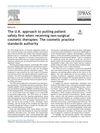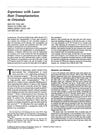 43 citations,
July 2019 in “Stem Cells International”
43 citations,
July 2019 in “Stem Cells International” Advancements in creating skin grafts with biomaterials and stem cells are promising, but more research is needed for clinical application.
 86 citations,
March 2018 in “ACS Biomaterials Science & Engineering”
86 citations,
March 2018 in “ACS Biomaterials Science & Engineering” MDP hydrogel heals wounds faster and better than other treatments in diabetic mice.
 13 citations,
January 2016 in “Journal of cosmetology & trichology”
13 citations,
January 2016 in “Journal of cosmetology & trichology” Alternative treatments show promise for hair growth beyond traditional methods.
 January 2016 in “Hair transplant forum international”
January 2016 in “Hair transplant forum international” Finasteride's link to health issues like male breast cancer, infertility, and prostate cancer needs more research through placebo-controlled trials to confirm.
 26 citations,
January 1994 in “Clinics in Dermatology”
26 citations,
January 1994 in “Clinics in Dermatology” Artificial skin is improving wound healing and shows potential for treating different types of wounds.
 June 2023 in “International journal of research in ayurveda and pharmacy”
June 2023 in “International journal of research in ayurveda and pharmacy” Dhatryadi Rasayana, an Ayurvedic herbal mix, may be a safe and effective way to prevent premature hair greying.

The study concludes that long COVID recovery involves time, various treatments, and a strong patient-provider relationship.
 2 citations,
December 2015 in “International Journal of Dermatology”
2 citations,
December 2015 in “International Journal of Dermatology” Washing test helps identify hair loss type, low iron levels significant.
 222 citations,
October 2014 in “Annual Review of Pharmacology and Toxicology”
222 citations,
October 2014 in “Annual Review of Pharmacology and Toxicology” Eph receptors and ephrins may be promising targets for treating diseases, but more understanding is needed for effective and safe therapies.
1 citations,
August 2023 in “Biomolecules” Certain immune-related proteins are higher in people with alopecia and their healthy relatives, hinting at a genetic link.

AnnoPharma effectively identifies substances causing adverse drug reactions in medical abstracts.
 3 citations,
May 2021 in “Indian Dermatology Online Journal”
3 citations,
May 2021 in “Indian Dermatology Online Journal” FUE is a versatile hair transplant technique with many uses and good outcomes when performed with skill.
 16 citations,
December 2016 in “Skin appendage disorders”
16 citations,
December 2016 in “Skin appendage disorders” Nickel, cobalt, balsam of Peru, fragrance mix, carba mix, and propylene glycol are common allergens causing scalp contact dermatitis.
 1 citations,
February 2018 in “Journal of Plastic Reconstructive and Aesthetic Surgery”
1 citations,
February 2018 in “Journal of Plastic Reconstructive and Aesthetic Surgery” The U.K. created the CPSA to set safety standards for non-surgical cosmetic treatments and improve patient protection.
 3 citations,
January 2015 in “Social Science Research Network”
3 citations,
January 2015 in “Social Science Research Network” The conclusion is that off-label drug use can lead to important medical discoveries and improve patient care.
 37 citations,
September 2014 in “Plastic and Reconstructive Surgery”
37 citations,
September 2014 in “Plastic and Reconstructive Surgery” Combining microsurgery with craniofacial reconstruction improves aesthetic results and reduces harm to the area where tissue is taken from.
 22 citations,
November 2014 in “Psychiatric Clinics of North America”
22 citations,
November 2014 in “Psychiatric Clinics of North America” Stress can worsen skin conditions and affect mental health, so doctors should include stress management in skin treatment.
 33 citations,
November 2014 in “Military Medicine”
33 citations,
November 2014 in “Military Medicine” The U.S. military's teledermatology program was effective in providing fast and successful skin care in remote locations, preventing unnecessary evacuations.
 12 citations,
August 2013 in “Facial Plastic Surgery Clinics of North America”
12 citations,
August 2013 in “Facial Plastic Surgery Clinics of North America” Choose hair restoration surgery candidates carefully and plan treatments for a natural look and future hair loss.
 37 citations,
August 2013 in “Facial Plastic Surgery Clinics of North America”
37 citations,
August 2013 in “Facial Plastic Surgery Clinics of North America” Facial hair restoration is generally successful and satisfying for patients when done with quality techniques and realistic expectations.
 7 citations,
January 2013 in “Indian Journal of Plastic Surgery”
7 citations,
January 2013 in “Indian Journal of Plastic Surgery” Body and beard hair can be used for hair transplants in baldness treatment but keep their original color and curl.
 25 citations,
June 2013 in “Obesity Reviews”
25 citations,
June 2013 in “Obesity Reviews” Mesotherapy might help reduce fat in specific areas for those close to their ideal weight, but more research and care are needed to ensure safety.
 9 citations,
February 2013 in “Plastic and Reconstructive Surgery”
9 citations,
February 2013 in “Plastic and Reconstructive Surgery” The article explains how to rebuild parts of the head and face and how to transplant hair to cover scars, highlighting the need for careful planning and choosing the right method for each patient.

The document reviewed various health-related books, focusing on abortion debates, medical conditions, and effective health communication.
 34 citations,
October 2004 in “Plastic and Reconstructive Surgery”
34 citations,
October 2004 in “Plastic and Reconstructive Surgery” Nasolabial skin-fat grafts are good for nasal reconstruction with minimal scarring and no need for bolsters, but smoking may affect graft survival.
 April 2004 in “Journal of The American Academy of Dermatology”
April 2004 in “Journal of The American Academy of Dermatology” The textbook "Dermatology" is highly recommended for its comprehensive content, user-friendly design, and extensive visual aids.
 November 2001 in “Dermatologic Surgery”
November 2001 in “Dermatologic Surgery” Galea fixation is a safe and effective way to remove bald scalp with minimal scarring and reduced stretch-back.
 3 citations,
March 1998 in “Aesthetic Surgery Journal”
3 citations,
March 1998 in “Aesthetic Surgery Journal” Experts suggest various surgical methods for hair restoration, including scalp reduction, transplantation using minigrafts, and establishing a permanent frontal hairline with follicular units. The drug finasteride may also be used alongside these procedures.
 4 citations,
April 1999 in “Dermatologic Clinics”
4 citations,
April 1999 in “Dermatologic Clinics” Long-pulsed ruby lasers effectively reduce hair for up to 2 years with minimal pain.
 2 citations,
October 1998 in “Dermatologic Surgery”
2 citations,
October 1998 in “Dermatologic Surgery” Adjusting laser settings improved hair transplant results in Oriental patients.





























